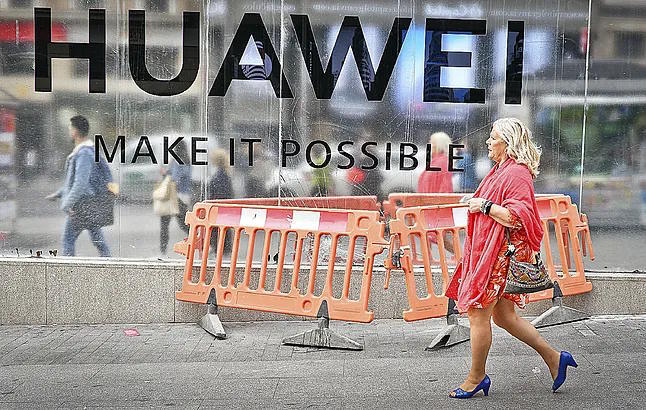North of the Chinese city of Shenzhen lies a huge campus filled with artificial lakes, castles, and European replicas: taking an electric train, you can visit the Heidelberg station (Germany), the Liberty Bridge in Budapest, the clock tower of Bruges, the walls of the University Paris Cité, the Münsterplatz square in Freiburg, the towers of Bologna, and buildings based on the Alhambra in Granada. This "little Europe" is Huawei's research and development center, where over 20,000 employees work, eat, and sleep.
Every year, the Chinese telecommunications giant organizes several trips to Shenzhen for the international press. Communication and marketing executives lavish journalists from around the world with lavish dinners at luxurious restaurants and several nights at a sumptuous hotel, also built by Huawei, near the company's headquarters. These trips sometimes also include European politicians, retired from the front line of parliamentary work in their countries, who now work part-time as lobbyists for Huawei.
Some of the journalists who frequently visit the Shenzhen campus are familiar with Huawei's charm offensive at the glamorous parties the company has organized on many occasions in Brussels, especially notable are the receptions for Chinese New Year at the exclusive Concert Noble ballroom. At these colorful events, journalists mingle with MEPs who return home with generous gift bags.
Huawei has invested many millions of euros to gain influence in Brussels. Its extensive roster of lobbyists is no secret in the Belgian capital. Nor is it a secret that its public relations campaign increased in 2019 after the geopolitical storm unleashed by suspicions towards its 5G equipment due to the company's inseparable ties with the omnipresent Chinese Communist Party (CCP).
Last week, media attention turned to Huawei's shenanigans at the heart of the European Union after a new bribery scandal erupted, reminiscent of the famous Qatargate of 2022, when the Gulf country was accused of trying to influence lawmakers through bribes and gifts.
In the latest operation, with twenty searches in Belgium and Portugal, the police arrested several individuals suspected of trying to benefit Huawei within the European Parliament. There are at least fifteen MEPs involved. "Corruption would have been practiced regularly and very discreetly from 2021 to the present, under the guise of commercial lobbying and taking various forms, such as remuneration for holding political positions or excessive gifts like meals, travel expenses, or regular invitations to football matches," the Belgian Prosecutor's Office stated.
Investigators have indicated that these payments could have been disguised as conference expenses and work trips. Last Friday, the European Parliament announced that it had banned access to its facilities for the nine representatives accredited to Huawei in both Brussels and Strasbourg.
According to data from the EU Transparency Register, Huawei Technologies spent between 2 and 2.25 million euros on lobbying activities in the EU in 2021, 2022, and 2023. These figures are lower than the three million euros paid in the previous three years when the United States, during the first term of Donald Trump, pressured Europe to exclude Huawei from its 5G networks. Trump accused Huawei of being a threat to the West and of operating as a spying agency that leaked security, corporate, and technological information to China from other governments. Washington placed the Chinese company on its blacklist. Other countries like Australia and the United Kingdom also quickly banned Huawei's participation in their 5G networks. The then U.S. Secretary of State, Mike Pompeo, made several tours of Europe to pressure bloc countries, including Spain, to extend the ban on Huawei.
In 2019, thanks to the mediation of well-known Huawei lobbyists like Acento, the consultancy founded by former socialist minister José Blanco, and former President José Luis Rodríguez Zapatero, Telefónica opted for Huawei's infrastructure for 5G. However, in recent years, the presence of the Chinese company in critical Spanish networks has weakened, culminating in its exclusion last December when Telefónica awarded Nokia the final part of its 5G core.
Several publications have been uncovering various connections between Huawei and the top echelons of Spanish politics in recent years. Therese Jamaa, partner of the Foreign Minister, José Manuel Albares, was the president of Huawei Spain from January 2022 to May 2023; UCO investigations indicate that businessman Víctor de Aldama, the middleman in the Koldo case, worked as a consultant, as did Anabel Mateos, wife of the Secretary of State for Telecommunications, Antonio Hernando, for the Chinese company, which even hired the communication agency of Zapatero's daughters.
For many years, both Republicans and Democrats from the U.S. have pointed to Huawei as the "surveillance arm" of the CCP. Several international investigations have indicated that this company's equipment has been used in China's Xinjiang region to monitor devices used by the Uighur Muslim minority, victims of severe repression by Beijing.
